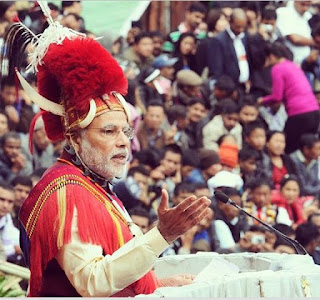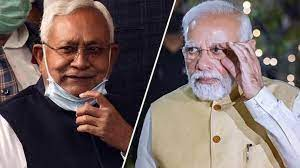....Even Statistics forced Nitish decision to embrace Modi .... Not just politics or sheer opportunism
The BJP is also calculating a vital fact of the matter. JD-U may fold up after Nitish retirement and that vote of the JD-U of Kurmis chiefly will shift towards the saffron party.
JD(U) leader and Bihar Chief Minister had slogged hard to unite opposition. He has high ambitions and presumed he would be accepted as a face to take on PM Narendra Modi. But he was let down, Mamata Banerjee and Arvind Kejriwal came out openly when they suggested Mallikarjun Kharge's name as chairman of the I.N.D.I alliance.
Initial impression was they snubbed Rahul Gandhi. But Janata Dal (U) found out that in effect it was a plan -- albeit sinister type strategy - evolved by Team Rahul only. Under that conspiracy of the 'caucus', Kharge was named as alliance chairperson.
The game was Kharge would keep the 'prized post' warm and if opportunities come after polls it would be passed onto Rahul. One easily available argument would be , Kharge is aging and the country needs a young and dynamic Prime Minister.
Left to them, Nitish and his JD-U colleagues were aware of his caste strengths.
Between Nov 2005 to mid-2013 Nitish has been in power in Bihar in coordination with the BJP. It formed a formidable alliance. In 2009 Lok Sabha elections, JD-U and BJP did well in Bihar but L K Advani could not lead NDA to electoral win.
After Nitish parted ways from the BJP, since June 2013, the real polity was that both the RJD and the saffron party tried many tricks to make Nitish Kumar irrelevant in Bihar politics.
But no 'electoral majority' in the state could have been imagined without him in the past three decades. In 2024 too nothing much changed and hence Modi-Shah decided to give green signals in having back in the NDA fold.
JD(U) leaders also took cognizance of recent media studies/surveys. One survey claimed among BJP/NDA voters nearly 65 per cent said Ram is a major poll issue and the BJP's ecosystem will exploit it to the hilt.
Even otherwise Modi has been very popular in Bihar. Nitish-led JD(U) had contested 2014 Lok Sabha polls alone. It was a clean sweep for BJP and LJP and JD(U) and RJD suffered severely.
In 2019, contesting in partnership with BJP, the JD-U had won 16 out of 17 Lok Sabha it contested while BJP won all 17. This time with Ram leher blowing across the north and many other parts of India including Bihar, Nitish apprehended that his party's base will shrink further.
There was also a possibility that the BJP could have actually lost a few seats. With JD(U) joining the NDA, the chances of the saffron party increasing its tally in the state has increased. After Mamata's going solo missive and AAP dumping the Congress in Punjab, Bihar coup is a major win for the BJP even symbolically.
Likes of K C Tyagi also analysed that any 'challenge' to Modi to return to power depended on BJP's UP performance in and if the performance in north and west India that is Rajasthan and Gujarat are according to BJP's plains; the BJP will be almost in power.
It will not matter much what happens in the remaining states then.
It s true all other anti-Modi political forces are solely drawing their strengths from family-based political approach. Congress, RJD and Samajwadi fall in this category. On the part of Trinamool too, Mamata had promoted her Bhaipo (nephew).
Ayodhya places Narendra Modi 'Numero Uno' even as Opposition is splintering out
Ram temple places India’s PM Modi in prime position :::
Chief Opposition protagonist Nitish Kumar, who was almost a Prime Ministerial candidate is now party of the BJP-led NDA. The political message is ...it is better to join him because we cannot defeat him.
Sarcasm has replaced political bitterness. The BJP leaders are now so confident post-Ram temple inauguration that Chief Minister of Assam, Himanta Biswa Sarma says, "Congress leader Rahul Gandhi is our (saffron party's) Star Campaigner".
There are multiple reasons for such confidence. Ever since the temple inauguration there has been a virtual 'God Ram or Hindutva wave' in favour of Prime Minister Narendra Modi and the BJP. Modi is now being hailed as a civilisational hero for the Hindus.
The BJP is confident of sweeping the upcoming general elections — to be held between April and May.
Look at the reasons, ever since the grand opening, Hindus have made a beeline to this ancient town in northern Indian state of Uttar Pradesh regarded as the birthplace of Ram, one of Hinduism’s most revered deities.
They cite numerous reasons to hail Modi as their “civilizational hero” and the BJP sees a “huge electoral wave fueled by Lord Ram himself” in their favor.
The BJP has been projecting Modi as the prime minister who brought Ram back to his original home. The Hindu deity, according to the pro-Hindu party, had been displaced and has lived in exile since the Babri Masjid was built in the 16th century on the site believed to be his birthplace.
This project was decades in the making after a Hindu mob demolished the mosque on Dec. 6, 1992. The Indian prime minister not only brought Ram back but also transformed Ayodhya, a crumbling, dusty town on the banks of Saryu river, a tributary of the holy Ganges, into what Hindu nationalists have dubbed the “Hindu Vatican.”
Ayodhya now boasts a brand-new airport, an upgraded railway station, and luxury hotels with a capacity to welcome nearly 50 million religious tourists every year. The BJP believes Modi is unbeatable. There is no opposition left to confront him at the hustings.
The Congress, which ruled India for years after independence in 1947, suffers from a serious leadership crisis. Its plan to forge an alliance of opposition parties is proving a non-starter. On Jan 28, a major (opposition) alliance partner, Nitish Kumar, chief minister of eastern Bihar state and leader of Janata Dal-U (the United People's Party) dumped Congress and its political partners to join hands with Modi's BJP.
Before him, two other regional satraps, Mamata Banerjee, chief minister of West Bengal, and Arvind Kejriwal, chief minister of Delhi, also dissociated themselves from Congress.
"The message is clear. These leaders grounded in electoral reality are smartly distancing themselves from Congress, which is being seen as an anti-Hindu party," says sociologist Tushar Bhadra from Varanasi in northern Uttar Pradesh.
Observers like him feel religion is no more about leading a traditional, peaceful way of life for the majority of Indians. It is a powerful tool that has changed the way they perceive politics. And one cannot blame the politicians alone for this change.
Bhadra has a point. The same people — politicians and intellectuals who once said a temple built on the ruins of a mosque cannot be considered a temple — are calling the idol of an infant Ram installed by Modi as a “national icon.”
Many among them, including non-Hindus, and Christians in particular, realize that the Western model of democracy adopted by India post-independence is on the wane.
The new India under Modi is not apologetic about its “Indianness” in the civilizational context and is certainly not defensive about Hindu culture. I still remember Jan 12, 2003 -- first rally Narendra Modi addressed as Gujarat Chief Minister outside his native state in Mumbai, wherein he said, "Do not be apologetic about Hindutva".
There is a new school of thought, which says one cannot compare apples to oranges. A Masjid cannot be an inherent part of Indian history. The mosque in Ayodhya was called Masjid-e-Janmesthan (Mosque dedicated to the birthplace). How can there be such a name?
The proposition is that Hindus, who are democratic in thought, never asserted their collective power. They belong to different castes and follow various ways of worship.
But with the Ayodhya temple becoming a reality, Hindus have emerged as a united force and it is an occasion to celebrate.
But this cannot be an end in itself. It is just the first step and there is a clear road map ahead.
In 2024, India starts thinking of itself as a Hindurashtra (Hindu nation) beginning a new era of Hindu assertion.
“Smart politicians like Nitish Kumar realize this, and are hence joining the bandwagon led by Modi, to be on the winning side,” said a retired school teacher in Ayodhya.
Even the psephologists in New Delhi agree that the 2024 electoral battle in India might end up as a no-contest. “A Modi versus nobody scenario,” as one of them chose to describe it.
“The BJP is always in touch with ground reality. They have enough cadres and resources. And PM Modi is a mass-based, popular leader. No party in the opposition has the strength to take them on,” Janata Dal-U spokesman K C Tyagi told UCA News.










No comments:
Post a Comment